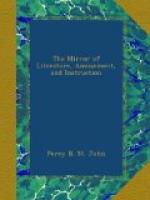* * * * *
SPIRIT OF THE PUBLIC JOURNALS.
SIR WALTER SCOTT.
(From the first of “Living Literary Characters,” in the New Monthly Magazine.)
It would be superfluous to continue the list of his prose works: they are numerous; but they are in all people’s hands, and censure or praise would come equally late. He has triumphed over every difficulty of subject, place, or time—exhibited characters humble and high, cowardly and brave, selfish and generous, vulgar and polished, and is at home in them all. I was present one evening, when Coleridge, in a long and eloquent harangue, accused the author of Waverley of treason against Nature, in not drawing his characters after the fashion of Shakspeare, but in a manner of his own. This, without being meant, was the highest praise Scott could well receive. Perhaps the finest compliment ever paid him, was at the time of the late coronation, I think. The streets were crowded so densely, that he could not make his way from Charing Cross down to Rose’s, in Abingdon-street, though he elbowed ever so stoutly. He applied for help to a sergeant of the Scotch Greys, whose regiment lined the streets. “Countryman,” said the soldier, “I am sorry I cannot help you,” and made no exertion. Scott whispered his name—the blood rushed to the soldier’s brow—he raised his bridle-hand, and exclaimed, “Then, by G-d, sir, you shall go down—Corporal Gordon, here—see this gentleman safely to Abingdon-street, come what will!” It is needless to say how well the order was obeyed.
I have related how I travelled to Edinburgh to see Scott, and how curiously my wishes were fulfilled; years rolled on, and when he came to London to be knighted, I was not so undistinguished as to be unknown to him by name, or to be thought unworthy of his acquaintance. I was given to understand, from what his own Ailie Gourlay calls a sure hand, that a call from me was expected, and that I would be well received. I went to his lodgings, in Piccadilly, with much of the same palpitation of heart which Boswell experienced when introduced to Johnson. I was welcomed with both hands, and such kind, and complimentary words, that confusion and fear alike forsook me. When I saw him in Edinburgh, he was in the very pith and flush of life—even in my opinion a thought more fat than bard beseems; when I looked on him now, thirteen years had not passed over him and left no mark behind: his hair was growing thin and grey; the stamp of years and study was on his brow: he told me he had suffered much lately from ill-health, and that he once doubted of recovery. His eldest son, a tall, handsome youth—now a major in the army—was with him. From that time, till he left London, I was frequently in his company. He spoke of my pursuits and prospects in life with interest and with feeling—of my little attempts in verse and prose with a knowledge




